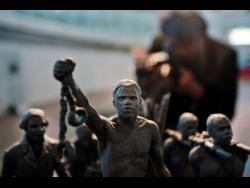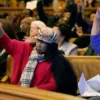
#Black Lives Matter Global Network, Rhodes Must Fall, and other civic movements mobilised anti-racism protesters around the globe in 2020 more effectively than at any other time in living memory. Oppressive statues in America and Europe have been toppled.
In 2021, the German government apologised and announced reparations of €1.1 billion for a century-old genocide in Namibia, while the following year, the Netherlands government apologised for the Dutch role in the transatlantic slave trade, establishing a €200 million fund to address its impact.
In 2023, the Church of England announced a £100 million investment fund for communities afflicted by slavery after researchers had discovered that its £9 billion endowment fund had benefited from the transatlantic slave trade. Harvard, Yale, and Oxford universities have all established programmes of restitution for their benefiting from the slave trade.
This edited volume, The Black Atlantic’s Triple Burden: Slavery, Colonialism, and Reparations, demonstrates the continuities of European slavery and colonialism in Africa, the Caribbean, and the Americas, examining calls for reparations in all three regions for what most now acknowledge to have been crimes against humanity. The book is authored by some of the most eminent scholars in the field from Africa, the Caribbean, the Americas, and Europe.
The authors are largely based in these regions, thus contributing substantively to efforts to transform educational curricula across the globe. The book seeks to be comprehensive and multidisciplinary and to enable cross-regional comparisons to be drawn in these important areas, thus ensuring that important global events are read from diverse perspectives. The volume is also aimed at subject area experts as well as at students in diverse areas of the humanities and beyond who seek a sound introductory reference book for these important historical subjects to which they are often not exposed. The authors thus represent a multidisciplinary group encompassing diverse fields such as history, international relations, politics, economics, sociology, anthropology, literature, and languages.
SCOURGES OF TRANSATLANTIC TRADE
Only by first explaining the scourges of the European-led, four-century transatlantic slave trade (in which 12-15 million African enslaved were transported to the Caribbean and the Americas), as well as colonialism and neo-colonialism, can we focus on the critical issue of reparations. It was the cumulative efforts, over nearly two centuries, of Pan-African activists, beginning in the diaspora, that would eventually liberate Africa and the Caribbean from European colonial rule and lay the foundation for the successful African American struggle for civil rights.
These were early prophets of reparatory justice for the crimes of slavery and colonialism. It was no coincidence that the contemporary Pan-Africanist movement was born in 1900, fifteen years after the partition of the continent was sealed at the notorious Conference of Berlin and 24 years after black Americans had had their rights revoked after the brief period of Reconstruction. Rather perversely, it was slave owners – and not the enslaved themselves or their descendants – who were compensated by the American, British, Dutch, and other governments for the loss of their “property”. The British government, for example, paid £20 million (the equivalent of £3 billion today) to slave owners after the abolition of slavery across the British Empire in 1833.
The quest for reparations for enslavement and colonialism can thus be traced back to eighteenth-century civil society activism in the African diaspora. It is always important to stress that Pan-Africanism was born in America and the Caribbean and not in Africa. The emancipation efforts of Pan-African activists from the 18th century through figures such as St Thomas’s Edward Blyden, as well as the Pan-African Conference of 1900 (led by Trinidad’s Henry Sylvester-Williams and South Africa’s Alice Kinloch) and the five Pan-African Congresses (driven by America’s W. E. B. du Bois and Trinidad’s George Padmore) between 1919 and 1945, were all critical to global Africa’s liberation.
MOBILISED SUPPORT
The United Nations (UN) World Conference Against Racism, Racial Discrimination, Xenophobia, and Related Intolerance held in South Africa’s port city of Durban in 2001 mobilised support for reparations across the Black Atlantic. For example, black Spaniards who attended the summit used it as a catalyst to organise conferences in Spain on the situation of its black citizens, demanding reparations for Madrid’s exploitative colonisation of Africa. This activism has also spawned groups such as the Black African and Afro-descendant Community of Spain, which fights for the political, social, and cultural rights of black Spaniards.
The most articulate African-American crusader of reparations has been the late civil rights and anti-apartheid activist Randall Robinson, who consistently argued for reparations to close the 250-year gap between white and black Americans created by plantation slavery. In the Caribbean, the Barbadian historian and chair of the Caribbean Community’s (CARICOM’s) Reparations Commission, Hilary Beckles, similarly noted that “slavery and genocide in the Caribbean are lived experiences despite over a century of emancipation”.
Modern ailments like diabetes and hypertension can be traced directly to the bad diet and sugary drinks inherited from the era of European slavery and colonialism. Beckles, therefore, urged European slaving nations (Britain, France, Portugal, Spain, the Netherlands, Sweden, and Denmark) to pay reparations to Caribbean countries in order to repair this damage through CARICOM’s 10-point plan involving an apology and socio-economic and cultural restitution, returning to the region the £20 million compensation paid by European governments to Caribbean slave owners.
During a visit to Lisbon by Brazilian president Luiz Inácio Lula da Silva in 2023, the Portuguese president, Marcelo Rebelo de Sousa, urged his country to apologise and accept full responsibility for its profits from the transatlantic slave trade in which Portugal had exported 6 million enslaved Africans to the Americas for four centuries – a past that Lisbon has scarcely acknowledged or taught in its school curricula.
STARTED TO RECOGNISE
In Latin America, Colombia has started to recognise its Afro-descendant communities by creating a reparations commission while its environmental campaigner, Francia Márquez, became the country’s first black vice president in 2022. Reformed land rights laws have further recognised collective land titles for Afro-Colombian communities. In 1993, black activists of Surinamese and Antillean ancestry based in Amsterdam pushed for an apology for three centuries of Dutch slavery in the Caribbean, and their demand for a monument and annual commemoration of this sordid trade was finally heeded in 2002. The descendants of Dutch slavery and colonialism in the Caribbean have further campaigned for the decolonisation of Dutch political, socio-economic, and cultural institutions in Holland as well as in their homelands.
In the African context, the late Nigerian historian Ade Ajayi was a member of the Organisation of African Unity’s (OAU’s) Eminent Persons’ Group (EPG) from 1992–1993 and along with his colleagues (particularly Nigerian philanthropist-politician Moshood Abiola, Kenyan intellectual Ali Mazrui, and Jamaican scholar-politician Dudley Thompson), demanded that the West recognise its moral debt to Africa and its diaspora for slavery and colonialism and pay these populations full monetary compensation.
The long-time reparations advocate Guyanese-British parliamentarian Bernie Grant also attended this meeting. The OAU’s 1993 Abuja Declaration was visionary in calling for the return of looted African artefacts to their rightful owners, which the French, German, British, and Belgian governments belatedly started to do two decades later. Inspired by Ajayi, the declaration called on African governments to establish national committees to study the damage of slavery and colonialism while promoting dissemination and education.
OBSERVER STATUS
The document further implored the OAU to grant observer status to diaspora groups working on restitution. Abuja also requested African states to accede to the “right of return” of all diaspora citizens wanting to resettle in their ancestral homelands. Building on this work, the African World Reparations and Repatriation Truth Commission, held in Accra in 1999, made similar demands as the Abuja Declaration. The meeting was attended by civil society representatives of 15 African and Caribbean countries, as well as diaspora delegates from the United States and Britain. Accra called specifically for compensation of $777 trillion as reparations from the West for slavery and colonialism, and for African traditional leaders to make land available for diaspora returnees.
More recently, the 55-strong African Union (AU) and the 20-member CARICOM held a four-day conference in Accra in November 2023 to forge a united front in order to persuade European nations to repair “historical mass crimes”. The summit established an Africa-based global fund to catalyse the reparations movement. The AU pledged to collaborate with the UN to investigate “mitigation options” for slavery and colonialism, and to determine whether enslavement constituted crimes against humanity at the time that they were committed.
AU delegates travelled to Barbados before the November 2023 summit to coordinate the AU–CARICOM strategy. CARICOM’s ten-point plan for reparatory justice remains one of the most comprehensive initiatives, calling for such measures as a full formal apology for enslavement, and debt annulment, and for European colonial powers to invest in the Caribbean’s health and education sectors. The University of the West Indies-commissioned Brattle report further estimated that Britain alone owed the region £18.8 trillion for three centuries of unpaid labour. Carla Barnett, CARICOM’s Belizean Secretary-General urged the movement to “speak with one voice to advance the call for reparations”, noting at the 2023 Accra summit: “We are at an important inflection point in the global movement for reparatory justice.”
Professor Adekeye Adebajo is a senior research fellow at the University of Pretoria’s Centre for the Advancement of Scholarship in South Africa. This article is an excerpt is from the recently published book, Adekeye Adebajo (ed.), The Black Atlantic’s Triple Burden: Slavery, Colonialism, and Reparations (Johannesburg: Jacana, 2024). Send feedback to columns@gleanerjm.com


